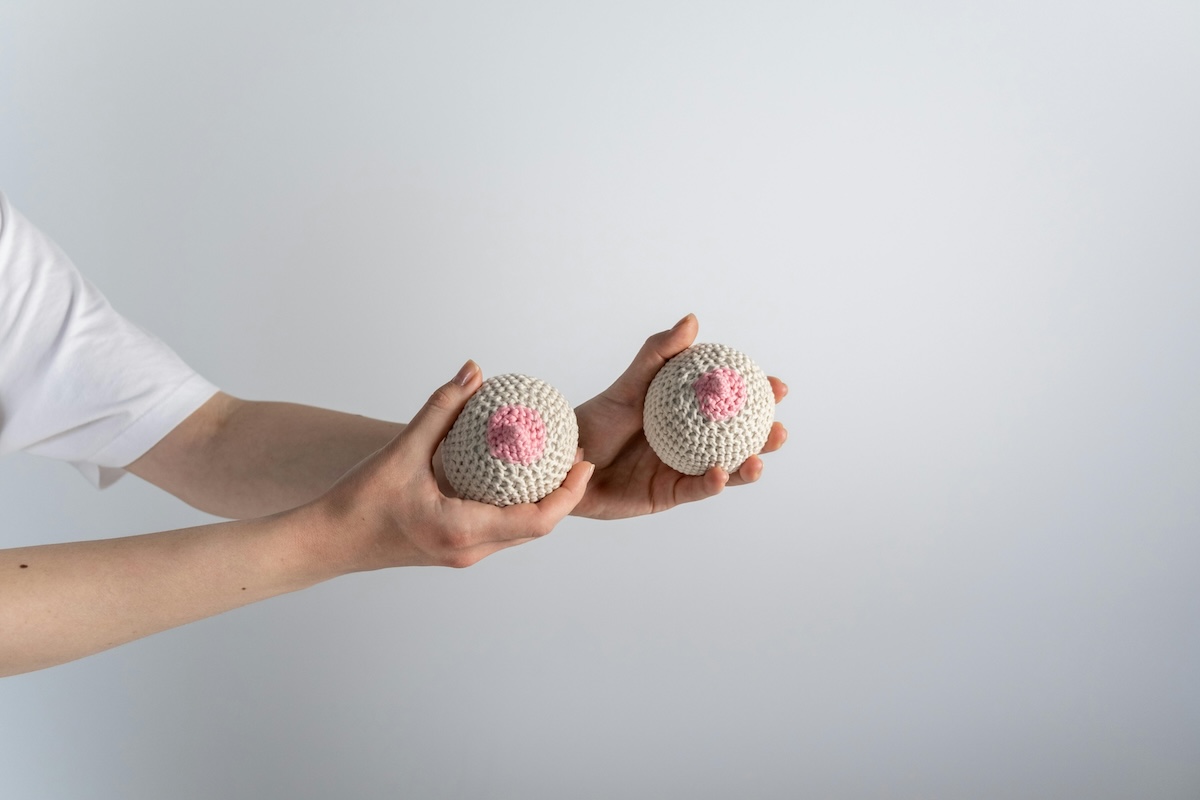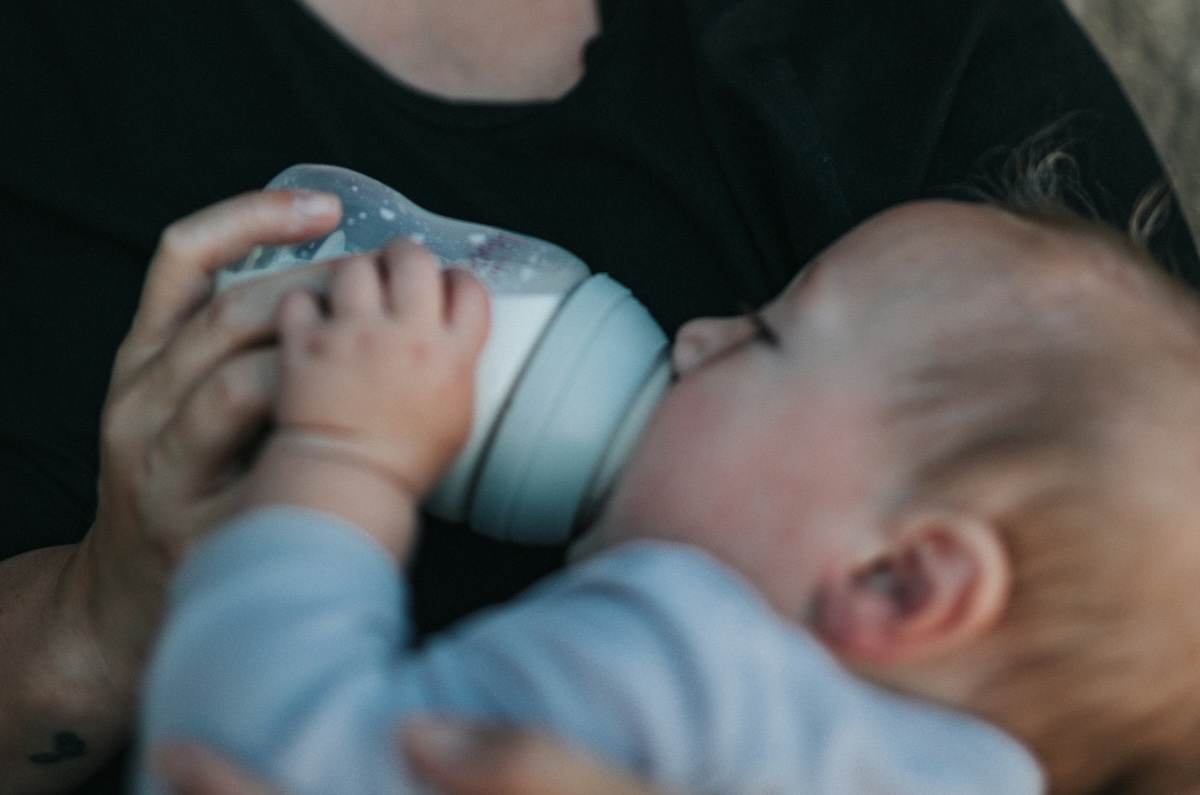After having a baby, you’ll experience a roller coaster ride of various hormones rising and falling, especially after delivery and with weaning. The tears seem to come from nowhere. Night sweats have left you shivering in a pool of sweat. Vaginal dryness makes the idea of having sex again much less sexy.
All these symptoms are related to hormonal shifts that occur as our body changes focus from growing a fetus to producing breast milk to support that fetus in the outside world. And even whether you breastfeed or not, your hormones go through complicated postpartum swings that can leave you feeling out of sorts (to say the least).
So what exactly is going on with our hormones when we are breastfeeding and weaning?

Your hormones during pregnancy
Your body starts preparing to feed a baby long before a baby is born. Breast tissue develops in puberty, driven by estrogen. Estrogen triggers milk-producing glands and ducts to branch and mature, preparing them to produce milk.
But one final step in maturation is needed before breast milk production begins. That last step only occurs with pregnancy. If you never become pregnant, your breast glands never progress past this level of maturity.
During pregnancy, breast glands undergo an additional maturation. As earlier, estrogen plays a role, but in this case, another hormone — prolactin — is the star player.
Prolactin is made by specialized cells in the pituitary gland called lactotrophs. Everyone has some prolactin circulating in their blood all the time, even men, but during pregnancy, high levels of estrogen and progesterone stimulate the pituitary gland to increase prolactin levels in the blood from about 10 nanograms per milliliter to about 200.
During pregnancy, this extra prolactin triggers breast glands to proliferate and branch. The breasts are then ready to produce milk, but they don’t produce much milk during pregnancy. While a person is pregnant, high levels of estrogen prevent them from producing breast milk. As the body prepares for delivery, prolactin levels reach their peak, and nipple stimulation, even from rubbing against clothing, causes the release of a second hormone — oxytocin. Together, these two hormones can override high estrogen levels that lead to leaking breasts in the weeks leading up to delivery.
Your hormones during postpartum
After a baby is delivered, the placenta follows soon after (this is the “third stage” of labor). When the placenta is delivered, progesterone and estrogen drop precipitously. The decline in these hormones has several effects. The drop is responsible for the night sweats many people experience after delivery. Dropping estrogen also seems to change concentrations of some neurotransmitters in the brain, which may play a role in postpartum mood changes.
In addition to the effect on sweating and mood, the drop in estrogen (along with the continued high prolactin levels) allows the breast glands to start secreting milk. On average, it takes three to five days after delivery for breast milk production to ramp up.
In the first four weeks after delivery, prolactin is the main driver of milk production. During this period, if milk is not removed from the breast either by nursing or pumping, prolactin will fall, and milk production will cease. If someone chooses not to breastfeed for any reason, the drop in prolactin is what will cause their milk to dry up.
After four weeks, milk production is driven by demand: the more milk expressed from the breast, the more milk is produced. Prolactin also affects changes in the mother’s body to support the balance of sugar and protein content in breast milk. Prolactin levels continue to be elevated until about six months postpartum, but they are not correlated with breast milk production beyond four weeks.
Prolactin, estrogen, and progesterone are not the only players here. The hormone oxytocin, released from the pituitary gland in response to nipple stimulation, acts on the breast lobules to move milk into the ducts; this is what we refer to as letdown.
In addition to driving letdown, oxytocin acts on the central nervous system. We believe this activity in the brain reinforces the psychological connection between the nursing infant and the mother. However, oxytocin also decreases levels of the hormone ACTH, which triggers the release of the stress hormone cortisol. Oxytocin may also moderate the release of the stress hormone epinephrine, also known as adrenaline. As a result, breastfeeding mothers have overall lower stress hormone levels compared with those who are not breastfeeding.
Together, prolactin and oxytocin suppress the hormones that drive ovulation. This is why many people will not have regular periods while they are breastfeeding. However, the degree to which ovulation is suppressed is highly variable. Some women must completely wean before their regular periods will resume. Others will get regular periods again as soon as feeding or pumping becomes less frequent, in some cases just four or five months after delivery. There is no way to predict what your experience will be in advance, but women often see their periods resume around the same time after each of their pregnancies.
Your hormones during weaning
After the hormonal ups and downs of pregnancy, people are often surprised to find that there are also hormonal ups and downs with weaning. This shouldn’t be surprising, though, because many of the same hormones play a role here.
Milk stasis — that is, allowing breast milk to sit in the ducts and glands of the breast — is the trigger that starts the body down the path toward pre-pregnancy function. The changes occur within hours. Prolactin and cortisol levels return to normal within days of weaning. Without nipple stimulation from nursing or pumping, oxytocin levels remain low.
The breast glands begin to return to their pre-pregnancy size and structure. Scientists theorize that this “pruning,” which occurs whether you choose to breastfeed or not, is one reason why people who have been pregnant have a lower risk of breast cancer.
The myriad hormonal shifts can also lead to mood changes such as anxiety and depression, night sweats, headaches, and fatigue. Without prolactin and oxytocin, the hypothalamus and pituitary will start to make the hormones that drive ovulation, and menstrual cycles will resume. All these changes are typically complete, and any symptoms are resolved within eight weeks of weaning.
Other hormones and breastfeeding
The above outline hits the main hormones involved in breastfeeding. However, the endocrine system is complex, and there are other hormones that can affect breastfeeding. In many cases, these can help us understand why breastfeeding can be challenging.
Cortisol
Scientists are finding that prolactin, oxytocin, and the stress hormone cortisol are closely connected. Higher prolactin and oxytocin levels decrease the concentration of stress hormones in the blood.
But this link also goes the other way: if someone’s stress hormones are elevated by physical or emotional stress, it can decrease prolactin levels and negatively impact breastfeeding. This may play an important role in breast milk production, particularly after physically stressful events such as prolonged labor or traumatic birth. This can be true throughout breastfeeding. Many people will find that stressful events, such as getting the flu or a death in the family, will decrease milk supply. Once the stress is relieved, breast milk supply will often rebound.
Thyroid hormone
Thyroid hormone affects breastfeeding in a few different ways. The main effect of thyrotropin-releasing hormone (TRH), which is made in the hypothalamus, is to stimulate the pituitary gland to make thyroid-stimulating hormone. This, in turn, tells the thyroid to make and release thyroid hormone. But TRH also stimulates the release of prolactin from the pituitary gland. Reminder, prolactin is the hormone that regulates milk production.
If there is too much thyroid hormone in the body, the hypothalamus will stop making TRH. This makes sense because it is effective in turning off the supply of new thyroid hormone. However, this may also decrease the release of prolactin. If there is too little thyroid hormone, the hypothalamus turns up the TRH signal, and this should increase prolactin levels.
In practice, what we see in women with too much thyroid hormone is that they can have either oversupply or undersupply of breast milk. Additionally, having too much thyroid hormone can inhibit letdown. When there is too little thyroid hormone, we usually see that breast milk supply is decreased. This is opposite to what we would expect based on the science above and is probably related to the direct effects of thyroid hormone on hydration.
New thyroid problems are common in the first year after giving birth. If you are struggling with over- or undersupply of breast milk or if letdown is an issue, it is reasonable to ask your doctor to check your thyroid levels (just a thyroid-stimulating hormone or TSH level is fine to start) to confirm they are normal and treat any issues.
The bottom line
- Breastfeeding is achieved through a complicated series of rises and falls in myriad hormones, including estrogen, progesterone, prolactin, oxytocin, and cortisol.
- With weaning, prolactin and oxytocin drop, and cortisol rises. This can cause mood changes, night sweats, fatigue, and headaches, but hormone levels settle, and symptoms typically resolve within eight weeks of weaning.
- Thyroid hormone can affect both breast milk supply and letdown, and new thyroid problems are common in the first year postpartum.





















Log in
Hi,
I had panic attacks postpartum and they stopped after I weaned (@2 years postpartum). While I had experienced panic attacks prior to pregnancy and after weaning, they were rare and triggered by PTSD. With my postpartum panic attacks, I had them every day, usually many in a day. As I decreased the frequency of breastfeeding as my kiddo got older, my panic attacks started changing; when I breastfed only once a day in the mornings (and no pumping), I would consistently have one panic attack in the early afternoon. The week I weaned was hard and then like magic the panic attacks were gone! It’s notable that the breastfeeding process was really easy and enjoyable and connecting for me and my kiddo; some days breastfeeding was the only anxiety free time. I’m super curious how daily variations in hormone levels related to breastfeeding could have primed me for panic attacks.
Can you comment on how/why breastfeeding hormones may impact someone physically? I was really injury prone and my joints were hypermobile and often sore during breastfeeding- my pelvic floor physio said it was due to breastfeeding hormones- this got much better for me after I weaned but it was a little scary going through it!
I’m confused because it says high estrogen during pregnancy prevents milk production but then later in the same paragraph says your breasts may leak in the last few weeks of pregnancy? Does that mean they are leaking something other than milk? Colostrum maybe?
Colostrum is a type of milk. It’s because as you near the end of pregnancy your placenta also nears the end of its life and stops working as well. I think there is also a rise in prolactin, hence why some people experience more leaking than others. Don’t quote me but this is my understanding of it.
Is there data on whether these changes happen with subtle changes in breastfeeding like dropping a feed or pumping session?
I haven’t read the data but my IBCLC warned me of this during dropping pumps and said not to drop more than one time session a week.
Great article. Thanks! I’m interested in understanding what happens to milk production while pregnant. As in, if one is still nursing and becomes pregnant again, how is milk production impacted?
Hi! Thank you for this and all the information you share!!
I’ve been wondering if extended breastfeeding (beyond a year or more) impacts the onset of menopause (or premenopausal symptoms). I’m 36 and still breastfeeding an almost 3 year old.
Great question! I’m wondering the same. I’m 41 and still breastfeeding my 2 year old.
I’m also interested in hearing more about periods and breastfeeding. Mine didn’t come back until almost 15 months postpartum and has been irregular since then (son is 18 months now and I’m still nursing).
Mine also came back at 15 months.
Lucky! Mine was back both times at 5 months. And I was EBF
I’m so curious about periods returning while breastfeeding. I have two kids, nearly exclusively breastfeeds both, pumped, fed at night, the works–and with the first, my period returned after 4 months, and with the second, after 2 months! Thoughts on why? Everything I read online says “well you must not have nursed them as much as you think you did” but I know that’s not the case.
Only one kid here. Breastfed him for 27 months. Total milk monster. Period returned at month 6…
Same! 4 months after first and 2 months after second. I was really hoping to be period-free for a little longer, but no…
I have a friend who used the rhythm method for all four kids and breastfed for all. She didn’t have periods until she weaned for all of her children. My wife got hers back at 6 weeks even though our son was a heavy feeder. Hope this topic is featured in a newsletter!
The rollercoaster after weaning! I wasn’t prepared for this! I’m so glad that it’s been talked about more. Re: thyroid testing. Is checking TSH sufficient or should the whole panel including antibodies be checked at least once?